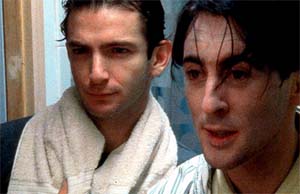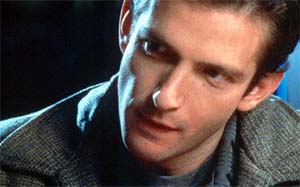
|
At first, the film parlays a number of urban legends - a dog in the microwave, the black market kidney industry - as they intersect with the, as yet, undefined travails of Charlie. Charlie - seen in flash-forward - opens the film with a tease: "Just give me a second to figure out the ending." That is, "the ending" of his own urban legend in the making. Urbania has a daylight-saving's metaphysic. In the beginning of the film, the spectator sees Charlie lying bed - not yet knowing that the off-screen space signifies an absence. He says to his lover in a flashback: "If I sleep in your space you'll be in my dreams." The film's space is that urban dreamland. ("Is it you?" Charlie pleads in random phone calls throughout the film - a modern, desperate attempt at connection with the beyond.) That's why the film's theatricality is so cinematic. Negative film space is filled with illumination - through editing, camera movement, or staging - like spotlights on stage. Each of the urban legends or terrors that creep into Charlie's dreamland is a drama played out in his mind. Tortured faces, gay cruisers in the shadows, the humping sounds of neighbors, mocking heterosexual dalliances - those taken-for-granted public displays of affection - enter into the emptied space. The urban landscape recalls renderings of the Stations of the Cross.
Flashbacks reveal a Gay Eden - life with Charlie's lover Chris (Matt Keeslar) and a birthday party with a penis cake. Enter the temptation of Forbidden Fruit: Dean (Samuel Ball), a serpent-tattooed thug who draws Charlie's attention - expressed in point-of-view shots - away from Chris. This expresses the ubiquitous attraction of hetero-standards of masculinity. It's the same ideology that sends Charlie out on his quest for glory. "Total eye for an eye - it was positively Biblical," Charlie gloats - his soul in torment. During this quest, he finds his unexpected mirror in Dean. In fact, this world built out of Charlie's fantasies, fears, and memories begins to encompass those of Dean and even other characters. It's Shear's "remote-mentality" perspective of city life. As if surfing through the culture, Urbania also connects with artworks by gay pop music artists - the best way to gauge the Queer movie crop. And Urbania is certainly one of the best of the last two years. The most trenchant song on the Pet Shop Boys album Release, titled "Birthday Boy," bestowed Christian compassion onto both Matthew Shepard and his murderers. The climactic moral channel-flipping of Urbania is equally open - and just as cathartic. The film's repeated mantra: "No objections to human needs." At once psychological and social, realistic and surrealistic, theatrical and cinematic, Urbania might be taking place entirely in that Charlie-Chris dream space even as it embraces the entire city. "I'm gonna lie here and tell myself stories," Charlie suggests. The entire film's running time elicits the very imaginative process from the spectator that Charlie must learn - forgiveness and mourning. "He Cried" from Maladjusted, Morrissey's last album, similarly evinced the spiritual truth in the spectacle of genuine emotion. One could set the words of Charlie's declaration to Morrissey's Gethsemane-staged faith in human feeling: "We'd be the stuff of legend / Almost worthwhile / I want it out of me / I want you in me" Futterman's soulful - theatrical, almost musical - line-readings display an actor's dramatic keenness in total empathy with his character's tragedy. He performs in the space where theatre and reality blend, where the gay experience becomes universal experience. Futterman cried. That is the stuff of legend. |
|
 Dan Futterman and Alan Cumming star in the film adaptaion of Daniel Reitz's Urbania
Dan Futterman and Alan Cumming star in the film adaptaion of Daniel Reitz's Urbania Charlie must choose
Charlie must choose